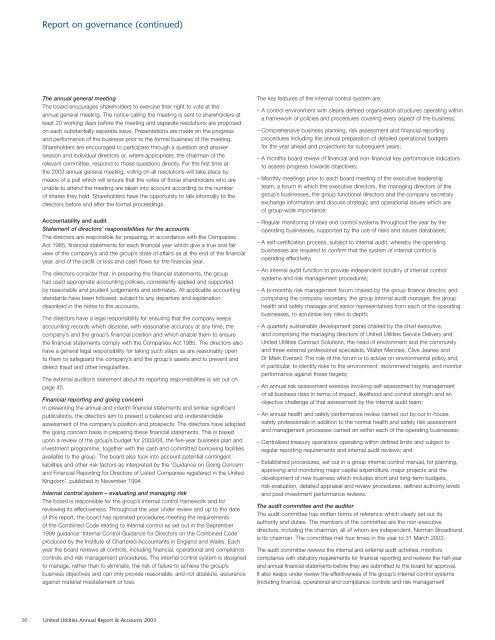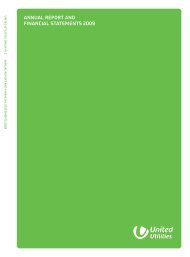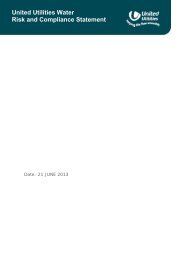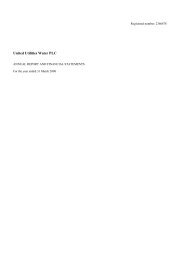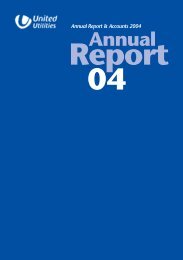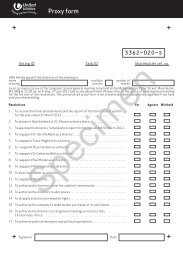United Utilities Annual Report and Financial Statements for the year
United Utilities Annual Report and Financial Statements for the year
United Utilities Annual Report and Financial Statements for the year
Create successful ePaper yourself
Turn your PDF publications into a flip-book with our unique Google optimized e-Paper software.
<strong>Report</strong> on governance (continued)<br />
The annual general meeting<br />
The board encourages shareholders to exercise <strong>the</strong>ir right to vote at <strong>the</strong><br />
annual general meeting. The notice calling <strong>the</strong> meeting is sent to shareholders at<br />
least 20 working days be<strong>for</strong>e <strong>the</strong> meeting <strong>and</strong> separate resolutions are proposed<br />
on each substantially separate issue. Presentations are made on <strong>the</strong> progress<br />
<strong>and</strong> per<strong>for</strong>mance of <strong>the</strong> business prior to <strong>the</strong> <strong>for</strong>mal business of <strong>the</strong> meeting.<br />
Shareholders are encouraged to participate through a question <strong>and</strong> answer<br />
session <strong>and</strong> individual directors or, where appropriate, <strong>the</strong> chairman of <strong>the</strong><br />
relevant committee, respond to those questions directly. For <strong>the</strong> first time at<br />
<strong>the</strong> 2003 annual general meeting, voting on all resolutions will take place by<br />
means of a poll which will ensure that <strong>the</strong> votes of those shareholders who are<br />
unable to attend <strong>the</strong> meeting are taken into account according to <strong>the</strong> number<br />
of shares <strong>the</strong>y hold. Shareholders have <strong>the</strong> opportunity to talk in<strong>for</strong>mally to <strong>the</strong><br />
directors be<strong>for</strong>e <strong>and</strong> after <strong>the</strong> <strong>for</strong>mal proceedings.<br />
Accountability <strong>and</strong> audit<br />
Statement of directors’ responsibilities <strong>for</strong> <strong>the</strong> accounts<br />
The directors are responsible <strong>for</strong> preparing, in accordance with <strong>the</strong> Companies<br />
Act 1985, financial statements <strong>for</strong> each financial <strong>year</strong> which give a true <strong>and</strong> fair<br />
view of <strong>the</strong> company’s <strong>and</strong> <strong>the</strong> group’s state of affairs as at <strong>the</strong> end of <strong>the</strong> financial<br />
<strong>year</strong>, <strong>and</strong> of <strong>the</strong> profit or loss <strong>and</strong> cash flows <strong>for</strong> <strong>the</strong> financial <strong>year</strong>.<br />
The directors consider that, in preparing <strong>the</strong> financial statements, <strong>the</strong> group<br />
has used appropriate accounting policies, consistently applied <strong>and</strong> supported<br />
by reasonable <strong>and</strong> prudent judgements <strong>and</strong> estimates. All applicable accounting<br />
st<strong>and</strong>ards have been followed, subject to any departure <strong>and</strong> explanation<br />
described in <strong>the</strong> notes to <strong>the</strong> accounts.<br />
The directors have a legal responsibility <strong>for</strong> ensuring that <strong>the</strong> company keeps<br />
accounting records which disclose, with reasonable accuracy at any time, <strong>the</strong><br />
company’s <strong>and</strong> <strong>the</strong> group’s financial position <strong>and</strong> which enable <strong>the</strong>m to ensure<br />
<strong>the</strong> financial statements comply with <strong>the</strong> Companies Act 1985. The directors also<br />
have a general legal responsibility <strong>for</strong> taking such steps as are reasonably open<br />
to <strong>the</strong>m to safeguard <strong>the</strong> company’s <strong>and</strong> <strong>the</strong> group’s assets <strong>and</strong> to prevent <strong>and</strong><br />
detect fraud <strong>and</strong> o<strong>the</strong>r irregularities.<br />
The external auditor’s statement about its reporting responsibilities is set out on<br />
page 45.<br />
<strong>Financial</strong> reporting <strong>and</strong> going concern<br />
In presenting <strong>the</strong> annual <strong>and</strong> interim financial statements <strong>and</strong> similar significant<br />
publications, <strong>the</strong> directors aim to present a balanced <strong>and</strong> underst<strong>and</strong>able<br />
assessment of <strong>the</strong> company’s position <strong>and</strong> prospects. The directors have adopted<br />
<strong>the</strong> going concern basis in preparing <strong>the</strong>se financial statements. This is based<br />
upon a review of <strong>the</strong> group’s budget <strong>for</strong> 2003/04, <strong>the</strong> five-<strong>year</strong> business plan <strong>and</strong><br />
investment programme, toge<strong>the</strong>r with <strong>the</strong> cash <strong>and</strong> committed borrowing facilities<br />
available to <strong>the</strong> group. The board also took into account potential contingent<br />
liabilities <strong>and</strong> o<strong>the</strong>r risk factors as interpreted by <strong>the</strong> ‘Guidance on Going Concern<br />
<strong>and</strong> <strong>Financial</strong> <strong>Report</strong>ing <strong>for</strong> Directors of Listed Companies registered in <strong>the</strong> <strong>United</strong><br />
Kingdom’, published in November 1994.<br />
Internal control system – evaluating <strong>and</strong> managing risk<br />
The board is responsible <strong>for</strong> <strong>the</strong> group’s internal control framework <strong>and</strong> <strong>for</strong><br />
reviewing its effectiveness. Throughout <strong>the</strong> <strong>year</strong> under review <strong>and</strong> up to <strong>the</strong> date<br />
of this report, <strong>the</strong> board has operated procedures meeting <strong>the</strong> requirements<br />
of <strong>the</strong> Combined Code relating to internal control as set out in <strong>the</strong> September<br />
1999 guidance ‘Internal Control Guidance <strong>for</strong> Directors on <strong>the</strong> Combined Code’<br />
produced by <strong>the</strong> Institute of Chartered Accountants in Engl<strong>and</strong> <strong>and</strong> Wales. Each<br />
<strong>year</strong> <strong>the</strong> board reviews all controls, including financial, operational <strong>and</strong> compliance<br />
controls <strong>and</strong> risk management procedures. The internal control system is designed<br />
to manage, ra<strong>the</strong>r than to eliminate, <strong>the</strong> risk of failure to achieve <strong>the</strong> group’s<br />
business objectives <strong>and</strong> can only provide reasonable, <strong>and</strong> not absolute, assurance<br />
against material misstatement or loss.<br />
The key features of <strong>the</strong> internal control system are:<br />
– A control environment with clearly defined organisation structures operating within<br />
a framework of policies <strong>and</strong> procedures covering every aspect of <strong>the</strong> business;<br />
– Comprehensive business planning, risk assessment <strong>and</strong> financial reporting<br />
procedures including <strong>the</strong> annual preparation of detailed operational budgets<br />
<strong>for</strong> <strong>the</strong> <strong>year</strong> ahead <strong>and</strong> projections <strong>for</strong> subsequent <strong>year</strong>s;<br />
– A monthly board review of financial <strong>and</strong> non-financial key per<strong>for</strong>mance indicators<br />
to assess progress towards objectives;<br />
– Monthly meetings prior to each board meeting of <strong>the</strong> executive leadership<br />
team, a <strong>for</strong>um in which <strong>the</strong> executive directors, <strong>the</strong> managing directors of <strong>the</strong><br />
group’s businesses, <strong>the</strong> group functional directors <strong>and</strong> <strong>the</strong> company secretary<br />
exchange in<strong>for</strong>mation <strong>and</strong> discuss strategic <strong>and</strong> operational issues which are<br />
of group-wide importance;<br />
– Regular monitoring of risks <strong>and</strong> control systems throughout <strong>the</strong> <strong>year</strong> by <strong>the</strong><br />
operating businesses, supported by <strong>the</strong> use of risks <strong>and</strong> issues databases;<br />
– A self-certification process, subject to internal audit, whereby <strong>the</strong> operating<br />
businesses are required to confirm that <strong>the</strong> system of internal control is<br />
operating effectively;<br />
– An internal audit function to provide independent scrutiny of internal control<br />
systems <strong>and</strong> risk management procedures;<br />
– A bi-monthly risk management <strong>for</strong>um chaired by <strong>the</strong> group finance director, <strong>and</strong><br />
comprising <strong>the</strong> company secretary, <strong>the</strong> group internal audit manager, <strong>the</strong> group<br />
health <strong>and</strong> safety manager <strong>and</strong> senior representatives from each of <strong>the</strong> operating<br />
businesses, to scrutinise key risks in depth;<br />
– A quarterly sustainable development panel chaired by <strong>the</strong> chief executive,<br />
<strong>and</strong> comprising <strong>the</strong> managing directors of <strong>United</strong> <strong>Utilities</strong> Service Delivery <strong>and</strong><br />
<strong>United</strong> <strong>Utilities</strong> Contract Solutions, <strong>the</strong> head of environment <strong>and</strong> <strong>the</strong> community<br />
<strong>and</strong> three external professional specialists, Walter Menzies, Clive Jeanes <strong>and</strong><br />
Dr Mark Everard. The role of <strong>the</strong> <strong>for</strong>um is to advise on environmental policy <strong>and</strong>,<br />
in particular, to identify risks to <strong>the</strong> environment, recommend targets, <strong>and</strong> monitor<br />
per<strong>for</strong>mance against those targets;<br />
– An annual risk assessment exercise involving self-assessment by management<br />
of all business risks in terms of impact, likelihood <strong>and</strong> control strength <strong>and</strong> an<br />
objective challenge of that assessment by <strong>the</strong> internal audit team;<br />
– An annual health <strong>and</strong> safety per<strong>for</strong>mance review carried out by our in-house<br />
safety professionals in addition to <strong>the</strong> normal health <strong>and</strong> safety risk assessment<br />
<strong>and</strong> management processes carried on within each of <strong>the</strong> operating businesses;<br />
– Centralised treasury operations operating within defined limits <strong>and</strong> subject to<br />
regular reporting requirements <strong>and</strong> internal audit reviews; <strong>and</strong><br />
– Established procedures, set out in a group internal control manual, <strong>for</strong> planning,<br />
approving <strong>and</strong> monitoring major capital expenditure, major projects <strong>and</strong> <strong>the</strong><br />
development of new business which includes short <strong>and</strong> long-term budgets,<br />
risk evaluation, detailed appraisal <strong>and</strong> review procedures, defined authority levels<br />
<strong>and</strong> post-investment per<strong>for</strong>mance reviews.<br />
The audit committee <strong>and</strong> <strong>the</strong> auditor<br />
The audit committee has written terms of reference which clearly set out its<br />
authority <strong>and</strong> duties. The members of <strong>the</strong> committee are <strong>the</strong> non-executive<br />
directors, including <strong>the</strong> chairman, all of whom are independent. Norman Broadhurst<br />
is its chairman. The committee met four times in <strong>the</strong> <strong>year</strong> to 31 March 2003.<br />
The audit committee reviews <strong>the</strong> internal <strong>and</strong> external audit activities, monitors<br />
compliance with statutory requirements <strong>for</strong> financial reporting <strong>and</strong> reviews <strong>the</strong> half-<strong>year</strong><br />
<strong>and</strong> annual financial statements be<strong>for</strong>e <strong>the</strong>y are submitted to <strong>the</strong> board <strong>for</strong> approval.<br />
It also keeps under review <strong>the</strong> effectiveness of <strong>the</strong> group’s internal control systems<br />
(including financial, operational <strong>and</strong> compliance controls <strong>and</strong> risk management<br />
36 <strong>United</strong> <strong>Utilities</strong> <strong>Annual</strong> <strong>Report</strong> & Accounts 2003


